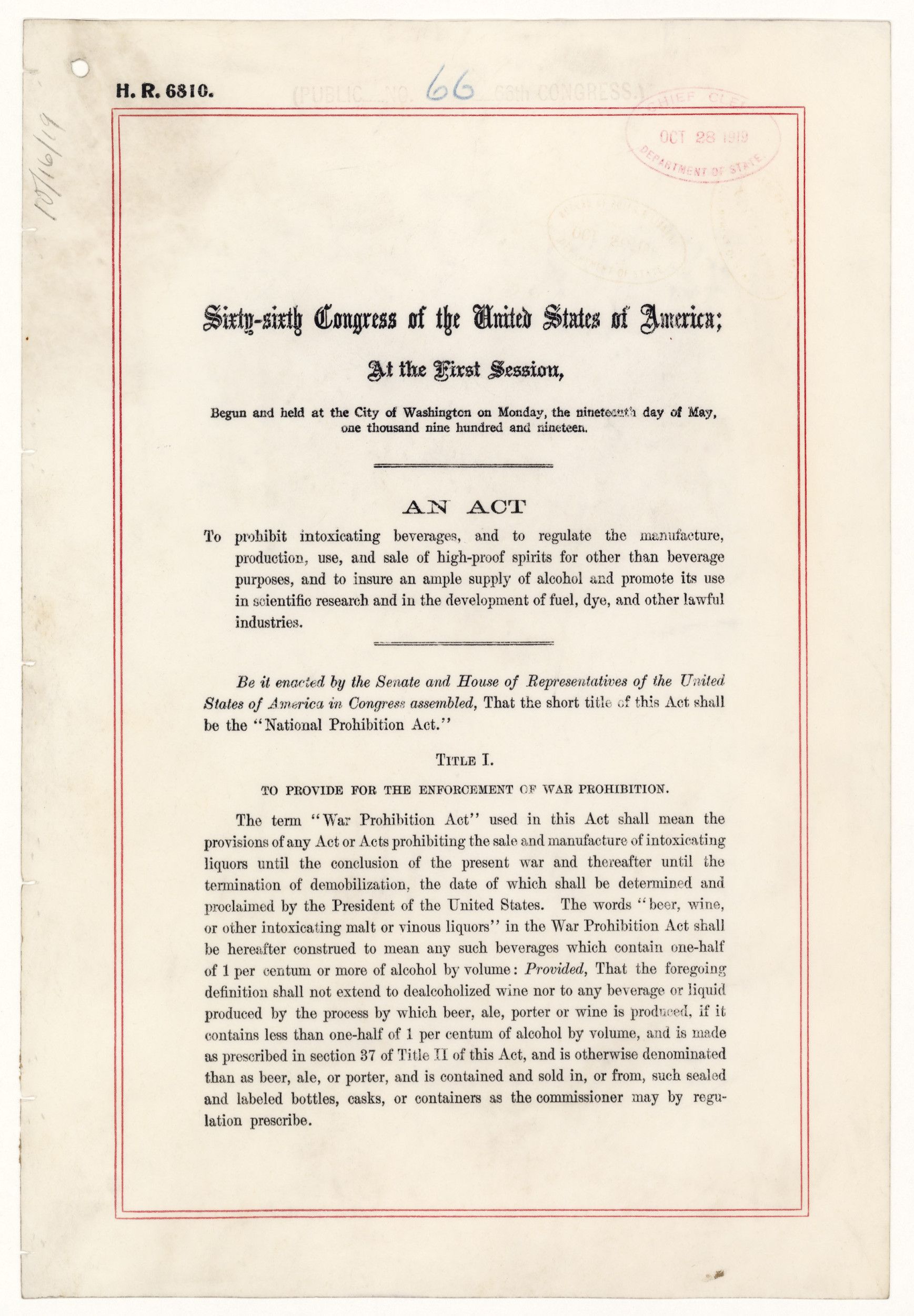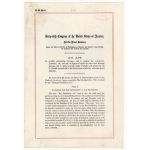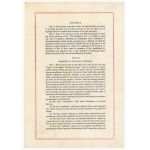The Volstead Act
10/28/1919
Add to Favorites:
Add all page(s) of this document to activity:

Add only page 1 to activity:
Add only page 2 to activity:
The Volstead Act implemented and provided an enforcement apparatus for the 18th Amendment, that prohibited "the manufacture, sale, or transportation of intoxicating liquors."
The amendment hadn't defined "intoxicating liquors," alcohol-related criminal activity, or what, if any, exceptions would be made to prohibition. These specifics were left to Congress, which passed the National Prohibition Act, often called the Volstead Act. President Woodrow Wilson vetoed the bill, but it was passed again and became law on October 28, 1919, only two months before Prohibition took effect.
The Volstead Act set a strict limit on alcohol content of .5 percent; criminalized the manufacture and sale (but not the consumption) of alcoholic beverages; and allowed for home manufacture and alcohol for medicinal and religious use. It also set stiff penalties for violations. A first conviction could result in a fine up to $1,000 and imprisonment up to six months. Property used in breaking the law could be seized.
Enforcing Prohibition was difficult and expensive, however. The long coastlines and borders of the United States aided smugglers. Bootleggers devised ingenious ways and places to make and sell alcohol. Law enforcement was underfunded and sometimes corrupt. Those arrested were often low-level violators.
As the cost of prohibition enforcement rose and the organized crime and violence associated with bootlegging gained more press coverage, support grew dramatically for repealing the 18th Amendment—or at least modifying the Volstead Act. Supporters argued that making alcohol legal again would provide jobs and taxes needed during the Great Depression and re-establish respect for the law. In 1933, the 21st Amendment repealed the 18th Amendment.
The amendment hadn't defined "intoxicating liquors," alcohol-related criminal activity, or what, if any, exceptions would be made to prohibition. These specifics were left to Congress, which passed the National Prohibition Act, often called the Volstead Act. President Woodrow Wilson vetoed the bill, but it was passed again and became law on October 28, 1919, only two months before Prohibition took effect.
The Volstead Act set a strict limit on alcohol content of .5 percent; criminalized the manufacture and sale (but not the consumption) of alcoholic beverages; and allowed for home manufacture and alcohol for medicinal and religious use. It also set stiff penalties for violations. A first conviction could result in a fine up to $1,000 and imprisonment up to six months. Property used in breaking the law could be seized.
Enforcing Prohibition was difficult and expensive, however. The long coastlines and borders of the United States aided smugglers. Bootleggers devised ingenious ways and places to make and sell alcohol. Law enforcement was underfunded and sometimes corrupt. Those arrested were often low-level violators.
As the cost of prohibition enforcement rose and the organized crime and violence associated with bootlegging gained more press coverage, support grew dramatically for repealing the 18th Amendment—or at least modifying the Volstead Act. Supporters argued that making alcohol legal again would provide jobs and taxes needed during the Great Depression and re-establish respect for the law. In 1933, the 21st Amendment repealed the 18th Amendment.
Transcript
Sixty-sixth Congress of The United States of America;At the First Session,
Begun and held at the City of Washington on Monday, the nineteenth day of May, one thousand nine hundred and nineteen.
AN ACT
To prohibit intoxicating beverages, and to regulate the manufacture, production, use, and sale of high-proof spirits for other than beverage purposes, and to insure an ample supple of alcohol and promote its use in scientific research and in the development of fuel, dye, and other lawful industries.
Be it enacted by the Senate and House of Representatives of the Unites States of America in Congress assembled, That the short title of this Act shall be the "National Prohibition Act."
Title I.
To Provide For The Enforcement Of War Prohibition.
The term "War Prohibition Act" used in this Act shall mean the provisions of any Act or Acts prohibiting the sale and manufacture of intoxicating liquors until the conclusion of the present war and thereafter until the termination of demobilization, the date at which shall be determined and proclaimed by the President of the United States. The words "beer, wine, or other intoxicating malt or vinous liquors" in the War Prohibition Act shall be hereafter construed to mean any such beverages which contain one-half of 1 per centum or more of alcohol by volume: Provided, That the foregoing definition shall not extend to dealcoholized wine nor to any beverage or liquid produced by the process by which beer, ale, porter or wine is produced, if it contains less than one-half of 1 per centum of alcohol by volume, and is made as prescribed in section 37 of Title II of this Act, and is otherwise denominated than as beer, ale, or porter, and is contained and sold in, or from, such sealed and labeled bottles, casks, or containers as the commissioner may by regulation prescribe.
H.R. 6810-4
Sec. 6. If any section or provision of this Act shall be held invalid, it is herby provided that all other provisions of this Act which are not expressly held to be invalid shall continue in full force and effect.
Sec. 7. None of the provisions of this Act shall be construed to repeal any provisions of the "War Prohibition Act", or to limit or annul any order or regulation prohibiting the manufacture, sale, or disposition of intoxicating liquors within certain prescribed zones or districts, nor shall the provisions of this Act be construed to prohibit the use of the power of the military or naval authorities to enforce the regulations of the President or Secretary of War or Navy issued in pursuance of law, prohibiting the manufacture, use, possession, sale, or other disposition of intoxicating liquors during the period of the war and demobilization thereafter.
Title II.
Prohibition Of Intoxicating Beverages.
Sec. 1. When used in Title II and Title III of this Act (1) The word "liquor" or the phrase "intoxicating liquor" shall be construed to include alcohol, brandy, whisky, rum, gin, beer, ale, porter, and wine, and in addition thereto any spirituous, vinous, malt, or fermented liquor, liquids, and compounds, whether medicated, proprietary, patented, or not, and by whatever name called, containing one-half of 1 per centum or more of alcohol by volume which are fit for use for beverage purposes: Provided, That the foregoing definition shall not extend to dealcholized wine nor to any beverage or liquid produced by the the process by which beer, ale, porter, or wine is produced, if it contains less than one-half of i per centum of alcohol by volume, and is made prescribed in section 37 of this title, and is otherwise denominated than as beer, ale, or porter, and is contained and sold in, or from, such sealed and labeled bottles, casks, or containers as the commissioner may by regulation prescribe.
(2) The word "person" shall mean and include natural persons, associations, copartnerships, and corporations.
(3) The word "commissioner" shall mean Commissioner of Internal Revenue.
(4) The term "application" shall mean a formal written request supported by a verified statement of facts showing that the commissioner may grant the request.
(5) The term "permit" shall mean a formal written authorization by the commissioner setting forth specifically therein the things that are authorized.
(6) The term "bond" shall mean an obligation authorized or required by or under this Act or any regulation, executed in such form and for such a penal sum as may be required by a court, the commissioner or prescribed by regulation.
(7) The term "regulation" shall mean any regulation prescribed by the commissioner with the approval of the Secretary of the Treasury for carrying out
This primary source comes from the General Records of the United States Government.
National Archives Identifier: 299827
Full Citation: Act of October 28, 1919 [Volstead Act]; 10/28/1919; Enrolled Acts and Resolutions of Congress, 1789 - 2011; General Records of the United States Government, Record Group 11; National Archives Building, Washington, DC. [Online Version, https://docsteach.org/documents/document/volstead-act, April 25, 2024]Activities that use this document
- Prohibition and Its Consequences
Created by the National Archives Education Team
Rights: Public Domain, Free of Known Copyright Restrictions. Learn more on our privacy and legal page.





